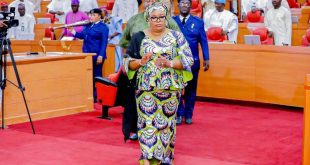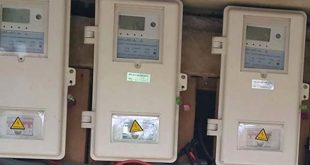
Marilyn Amobi, the managing director of the Nigeria Bulk Electricity Trading (NBET) Plc, fraudulently paid at least N2 billion naira to two power generating companies, documents obtained by Leaks NG have shown.
The documents also revealed that Mrs. Amobi, who was made the substantive boss of NBET in July 2016, was also involved in a series of corruption allegations such as subversion of board approvals and infraction of procurement laws.
Fraudulent payments to GENCOs
A few weeks after she was confirmed as the managing director of NBET, the organisation that manages the electricity pool in the country’s electricity supply industry, Mrs. Amobi started overpaying two power generating companies – Omotosho Electric Genco and Olorunsogo Electric Company – in flagrant violation of the details of a Power Purchase Agreement (PPA) the companies signed with the government in February and August 2016, respectively.
The PPA is an agreement between NBET and power generating plants for the sale and purchase of energy generated by the plants. Embedded within the PPA are the Gas Supply Agreement (GSA) that covers the supply of natural gas to the generating plant and the Gas Transportation Agreement (GTA), which is an agreement between gas transporters and power generating plants.
According to the PPA, to qualify for full payment, generating plants must provide evidence that they have active GSA and GTA or else the power purchase agreement would be deemed inactive and would only receive payment for the power they supplied.
“Seller (Omotosho Genco) hereby agrees that any claim for Available Capacity payment under the PPA are conditional on the Seller providing evidence acceptable to the Buyer (NBET) confirming that it has a legally binding and enforceable Gas Supply and Aggregation Agreement and Gas Transportation Agreement, in accordance with clause 3.2.2 and 4.2.1 of the PPA,” the agreement obtained by Leaks NG stated.
However, despite the fact that Omotosho did not provide evidence of gas supply aggregation and transportation, the company continued to tender request for full payment 20 months. According to the document in possession of Leaks NG, the over-invoicing was detected in October 2017 following an NBET internal audit.
On September 22, 2016, NBET had written to Omotosho requesting that it fulfills the condition for the PPA. The generating company was first given a 30-day grace to provide the necessary document. The window to provide the document was later extended to 90 day, yet it never provided the document.
For instance, in June 2017, Omotosho supplied energy to the tune of 33.16 megawatts but invoiced up to 161.74 megawatts.
This implies that Omotosho laid claim to an excess of 128.58 megawatts as excess capacity for the cycle.
For this capacity, Omotosho requested for payment of N1,023,532,574 instead of N209,824,177, leaving an excess of N813,708,397 for the capacity in June 2016.
Similarly, Olorunsogo Power Plc, whose PPA took effect from August 2014 in the said month, tendered 11.9 megawatts for energy while 197.83 as capacity. Since the PPA was not active, the capacity ought to be equal to the energy to make the firm qualify for payment as stated in the agreement.
Olorunsogo issued an invoice of N1, 251, 881, 528 for capacity for June 2016 as against N75, 363, 267 calculated by its actual energy. The difference is an over-invoicing of N1, 176, 518, 261.
For both firms, the over-invoicing amounts to N1, 990, 226, 658 as excess in just one month, June 2016.
Leaks NG could not lay hold to all invoices issued by the companies, the two we obtained showed that NBET made partial payments to the companies.
In one of the invoices, Mrs. Amobi paid Omotosho N339, 813, 418 in October 2016. The fund is part payment for July 2016 energy and capacity.
On the same date: October 11, 2016, NBET paid Olorunsogo N372, 498, 731 also as part payment for July.
These payments are clearly in breach of the PPA and the Nigerian Electricity Regulatory Commission (NERC) order of Transitional Stage Electricity Market (TEM).
Order IV of The TEM states that: “Gencos without effective PPAs shall be paid for their delivered energy and delivered capacity by NBET (Delivered capacity for the purposes of this order means the capacity equivalent of the energy delivered at Gencos busbar.”
These illegal payments wouldn’t have been possible without Mr. Amobi’s insistence.
While the Internal Audit of NBET refused to process the payment, Amobi signed the July payment on 13th October 2017 assuming the role of internal audit in violation of financial regulation.
This is a breach of Section 1705 of the financial regulations which states that “the Head of Internal Audit Unit in all ministries/extra-ministerial offices and other arms of government shall ensure that 100 per cent pre-payment audit of all checked and passed vouchers is carried out and the vouchers forwarded under security schedule direct to the appropriate Central Pay Office for payment. Checked and passed vouchers received in the internal audit Unit must be promptly dealt with and, under no circumstances shall a voucher be held in that unit for more than forty-eight (48) hours.”
Illegal payment to law firms
Sometimes in 2014, NBET wrote the Bureau of Public Procurement (BPP) to request the agency sign off on power procurement and retroactive no objection in procurement.
The request simply means that NBET requests to be excluded from being subjected to BPP act in its power purchase agreement. The request was declined by BPP.
In a response dated April 29, 2014, BPP stated that NBET, like other agencies, must follow due procurement process in power procurement.
BPP noted in its reply, “That if section 5 (a) of PPA was intended to exclude some sectors like the Power Sector, it would have been stated clearly. Consequently, giving NBET a one-off approval for NBET’s power procurement process would not only amount to a contravention of the Act, but it would also open a floodgate of similar requests thereby engendering confusion in the system.
“It is pertinent for NBET to note that electricity (being goods) can only be procured within one of the procedures stated in part 42.4 of standard bidding documents.
“The bureau therefore strongly advises that NBET should consult the Public Procurement Regulations, manuals for complex projects and standard bidding documents for procurement of goods, as this would assist NBET in complying with extant procurement rules and regulations.”
However, the management of NBET, then under the leadership of its inaugural Managing Director, Rumundaka Wonodi, was unsatisfied with the position of BPP. The agency sought legal advice on the way forward.
On June 1 2015, NBET advertised a notice for an expression of interest to engage lawyers in such cases, more specifically on BPP’s response.
According to the advert, the successful law firm is expected to discharge such duties as, “General, corporate, commercial and administrative law, with a view to advising NBET on general commercial and contract matters, providing legal opinions as necessary, and advising on various civil law.”
According to a report by NBET’s evaluation committee, three firms: Azinge and Azinge, Chukwuka Ugwu and Associate and John Erameh submitted their bids.
The process was however truncated upon advice by the Internal Audit Department of NBET.
Surprisingly, in April 2017, two years after, the Internal Audit received a request from Mrs. Amobi for payment of N30 million to two firms.
Mrs. Amobi wants Azinge and Azinge to be paid a contract sum of N14 million and Aelex N16 million respectively.
The process that led to this request was one replete with infractions and breach of public procurement law.
It is worthy of note that the procurement process was stopped in 2015 and if there would be a need for the services of law firms in 2017, the process of engagement is supposed to take an entirely new process according to procurement laws.
The BPP act in Section 16(1)(b) states the process of procurement; “based only on procurement plan supported by prior budgetary appropriations and no procurement proceedings shall be formalised until the procuring entity has ensured that funds are available to meet the obligations and subject to the threshold in the regulations made by the Bureau, has obtained a “Certificate of ‘No Objection’ to Contract Award” from the Bureau.”
There was no new advertisement or procurement process but Mrs. Amobi presented the two firms for payment.
Surprisingly, one of the firms laying claim to payment, Aelex, was not part of the 2015 process, as the firm was not captured in the evaluation report.
Illegal payment to consultant
In 2016, NEXANT, a software and energy firm, engaged a former staff of Power Holding Company of Nigeria (PHCN), Uzoma Achinaya, to provide advisory and analytics work for NBET.
According to the arrangement, Mr Achinaya would work for NBET for a period, present a report to NEXANT and claim his payment from NEXANT.
This indeed happened but instead of NEXANT to pay the consultant, NBET’s leadership decided to pay him despite not being party of the engagement agreement.
On January 23 2017, Mr. Achinaya wrote Mrs Amobi requesting NBET to pay him the sum of N7 million advance payment for the work he had done so far.
“I refer to the advisory and analytics work that l have done for NBET on the sustainable solutions to the Liquidity Challenges in the Nigerian Electricity industry.
“I appreciate the steps NBET management is taking to resolve the issues with NEXANT regarding my contract which has resulted in the delayed payment of my fees for the services rendered. However, I have some very urgent family commitments, including school fees for my children, which need immediate funding. It will be appreciated if I can be granted a payment advance in the sum of Seven Million Naira (N7, 000, 000.00}, in lieu of the money I am owed for the work already done, to enable me meet some of these commitments.
“The amount should be recovered from my payment when the issues with NEXANT are finally resolved.”
The irregularities in the request were flagged by the Internal Audit, which declined payment to Mr. Achinaya.
The audit department argued that it declined the payment because Mrs Amobi’s N7.5 million request was above her N2.5 approval threshold and that the process of contracting was not subjected to any procurement process.
Internal audit also argued that the consultant does not have a Tax Identification Number (TIN) as stipulated by procurement law, inside sources told Leaks NG.
To bypass the procurement part, Mrs. Amobi allegedly directed the Parastatal Tenders Board of NBET to seek consideration and approval for the requested fund.
The board submitted its report in March claiming that due process was followed in the award of the consultancy contract.
The memorandum for consideration and approval indicated that the bid was opened on March 1, 2017, with a deadline of March 6.
At the end of the process, two individuals were said to have emerged out of five expressions of interest received; Joe Agah with 59.7 total weighted scores and Uzoma Achinaya with 95.1.
The contract was later awarded to Mr. Achinaya at the sum of N25, 850, 000.
Even at that, the board did a shabby job in the cover-up.
The consultant started work in 2016, requested for payment in January 2017 for his ongoing work but the NBET management instituted a post-dated procurement process to make the payment possible.
Transfer of staff without board’s approval
In 2017, Mrs. Amobi made a request to the Accountant-General for officials from his office to be transferred to NBET to head the Internal Audit and Finance departments. Inside sources alleged that she made this request because she felt the officials who headed the department at NBET was standing in her way.
The request was granted in June 2017. The AGF posted Hauwa Bello from the National Centre for Women Development (NCWD) to head the Internal Audit. He also posted Sambo Abdullahi to the Learning and Development, a newly created department at NBET.
Waziri Bintube of the Finance Department was reposted to Risk and Guarantee, another department created by Mrs Amobi allegedly to victimise the two top officials.
A month earlier, Mrs. Amobi had facilitated the transfer of two people, Ajulo Adesola from the national Agency for Science and Engineering (NASENI) and Acho Onyechege from the Ministry of Niger Delta Affairs to NBET as treasury officers.
Though the new postings were communicated in a letter by AGF on 30 May 2018, they flouted the requirement of NBET charter which places the responsibility of recommending postings within the agency on the Human Resources Committee of NBET.
Section 2.4 (b) of the charter state that the Human Resource Committee shall ‘review and make recommendations to the Board for approval of the Company’s organisational structure and any proposed amendments.’
Although the Accountant-General reserves the authority to approve such reviews, the office does not have the power to make postings.
Amobi evasive, abusive
When contacted to respond to the series of allegations against her, Mrs Amobi, rained abuses Leaks NG reporter.
Without first listening to the reporter’s questions, in in a statement, replete with swear words, the MD she said she would not comment to any of the allegations because the issues are in court.
“If they are things about NBET that are currently in court, there is really no need…some of them are in court. I’m sure some people brought this to you.
“You’ve written a story about us before of us sending some people to America which of course didn’t happen. These are issues that are with EFCC, ICPC and even in the court,” she said.
After calling the reporter many unprintable names, Mrs Amobi ended the call.
This report was put together by Leaks.NG, a coalition of news and civil society organisations, which provide a platform for Nigerians to submit evidence of wrongdoing by public office holders in Nigeria. To make a submission, please go on Leaks.NG and follow the simple steps involved.
 DailyrecordNg …Nigeria's hottest news blog
DailyrecordNg …Nigeria's hottest news blog






